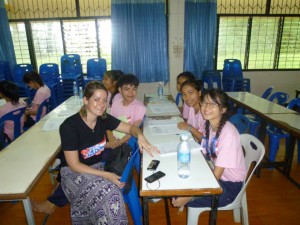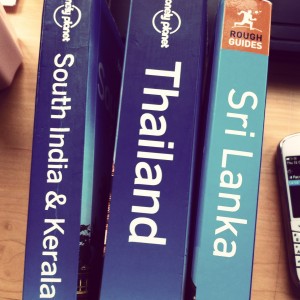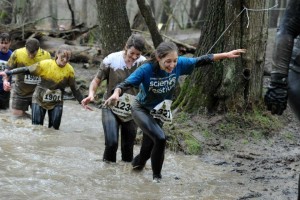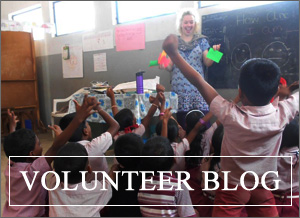Last week we were invited to take part in a Q&A Session on ‘International Work Experience’ at Glasgow University and we were asked some great questions so thought it would be great to write them up so you can have a read! We were invited to take part in the panel because the Scottish Government are trying to encourage students to see the value in obtaining international work experience and Glasgow University are keen to get their students involved.
A bit about me
I am the Programme Manager at VESL, I started this role in September 2012. I originally became involved with VESL after I had graduated from Edinburgh university and spent three months volunteering in India. When I returned I decided that I wanted to stay involved with VESL and pursue a career in international development, something I had previously considered but volunteering overseas confirmed this. I became VESL’s Overseas Programme Assistant in April 2012 and went on to be a Student Leader in July 2012 when I lead a team of five volunteers to India.
What are the benefits of volunteering overseas?
There are numerous benefits of volunteering overseas, not only to the host community, school and students but also volunteering is a great way to develop yourself. We have numerous volunteers who go overseas and come back saying that they’ve learned so much about themselves in such a short period of time… and it may sound cliche but it’s true. Volunteering overseas helps you develop a multitude of skills – communication skills (communicating with people who don’t speak the same language as you), organisational skills (planning for your trip, booking flights and travel) and problem solving skills. It also demonstrates to potential employers you are able to use your initiative as well as work both as a team and independently. Furthermore we see a lot of volunteers grow in confidence, whether that be speaking to a large group of people or being able to conquer their fears. Showing potential employers you’re doing some worthwhile with your summer and developing yourself rather than going on holiday is really important.
‘One in five managers hired someone because of their volunteer experience’ Linkedin For Good
All our volunteer projects are carefully chosen by our country managers to ensure that volunteers can be of real and measurable benefit to the local communities. We have important reasons for working in the countries we do, and you can find out more information by going to our country profiles. By volunteering on a VESL project and putting in all your effort to making a difference overseas, you can be sure you have spent a summer well, encouraging students to continue to learn English to increase their future employment prospects.
What is the biggest challenge?
Volunteers often say that the language barrier is the biggest challenge to start with, and from my personal experience I would definitely agree. My host family spoke very little to no English which when I first arrived was pretty terrifying… however only a couple of weeks later I felt like an additional member to the family. There are numerous ways to communicate from facial expressions to hand gestures to drawings to learning some of the local language (being fully immersed in the culture you would be surprised how quickly you pick it up!). If there are any problems you can’t solve then the Country Manager is only a phone call away.
Other volunteers have said that adjusting to life in country (culture shock) is the biggest challenge… from the big portion sizes to the basic living conditions. It often takes volunteers a week or two to adjust to their new surroundings and this is normal in any situation. The biggest culture shock for me was the size of the house that I stayed in which housed two families amounting to nine people (plus me) in a very tiny three bedroom house. It definitely was a shock but I got used to it very quickly and the bond I formed with my host family will stay with me forever… I volunteered in 2011 but I still keep in touch with now.
What is the best way to prepare?
Read as much as you possibly can about the country you’re going to, our blog has tonnes of articles from past volunteers and they are an excellent way to get an idea of what it will be like overseas. Do your research on the internet – google the local area, find out about local cultures and customs, learn a little bit of the local language. We encourage people to prepare as much as possible but at the same time to go with a very open mind, in the countries we work in things often change last minute so being adaptable and flexible are very important. When I first arrived on my project in India I was told my host family had dropped out, I temporarily lived with another volunteer whilst a new host family was found (just a couple of days). I knew that things changed all the time in India so I wasn’t at all worried about this… so make sure that you go out there with an open mind and don’t stress if things don’t go exactly to plan… it all works out in the end!
What experience do you need? How do you make your application stand out?
We judge each application on it’s own merit, our applications are open to volunteers between the age of 18-70*. We look for volunteers who are enthusiastic about making a difference overseas, the application form is broken down into several sections. It asks about your voluntary experience, your experience(s) living or traveling overseas, fundraising and your teaching experience. That is not to say that all our volunteers have experience of all of the above, the most important things are to be enthusiastic, adaptable, creative and motivated!
Even though this is a volunteering project we can’t accept everyone that applies to the programme, we strongly believe in matching people’s skills and experience to a project to ensure the project is a success and the volunteer enjoys their time overseas.
To apply you just need to download our application form online and get it sent into us soon as possible so we can arrange an interview.
How did you fundraise for your project?
I have fundraised for VESL on several occasions. For my original project in 2011 I ran (and walked!) a half marathon, I did some car boot sales and cake sales and I asked my employer to donate money to the project and they kindly donated £100. The second time I fundraised I wrote to about 20 trusts and foundations asking for donations and received four different donations amounting to over £800 and I also did a raffle. Last year I took part in an activity called the Major Series with friends and family and we collectively raised over £1000 for VESL projects.
Each year volunteers come up with a number of different ideas to fundraise their money, the top five fundraisers of 2013 were:
- Holding an event – a charity gig, a race night, a community event, a talent show etc.
- Bag packing at a local supermarket
- Cake sales at university and work
- Writing to trusts & foundations
- Taking part in a sponsored event – from races to a sponsored silence to dressing up as a sheep for a week.
Having volunteered myself I aim to provide volunteers with as much fundraising advice as possible, this includes our fundraising blog, fundraising guide and weekly emails (these will start shortly). Don’t let the idea of fundraising put you off, fundraising helps raise awareness of the work VESL is doing overseas and it can be fun!
If you have any questions that have not been answered above don’t hesitate to get in contact either by commenting below or sending us an e-mail. You can e-mail on [email protected] and I will be happy to answer your question(s)!
*currently we are unable to accept volunteers who have North American citizenship due to our insurance policy, this is something we are looking to rectify in the future but we are currently unable to accept volunteers with North American citizenship (including dual)






Comments are closed.